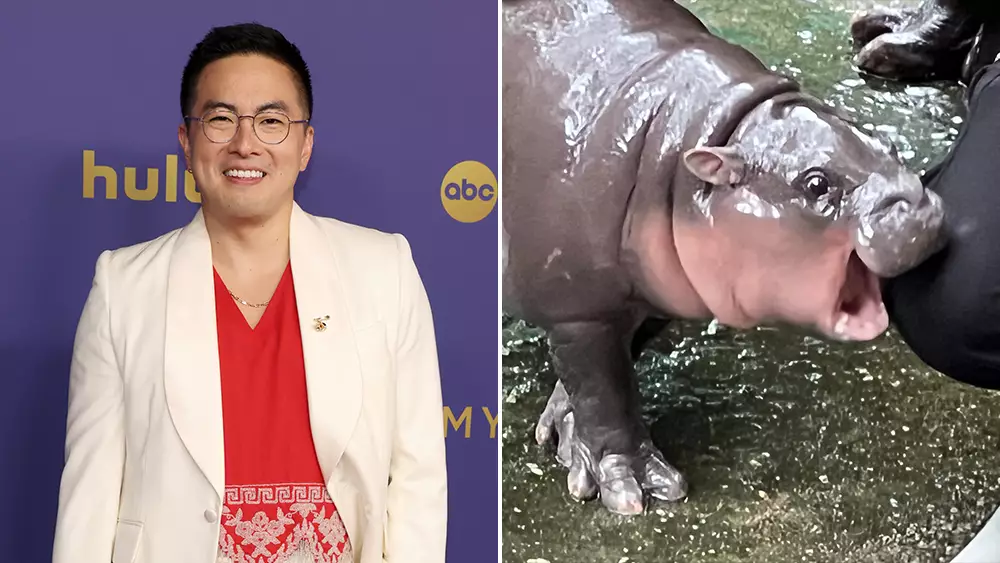The intersection of animal rights and entertainment has never been more apparent than in the recent portrayal of Moo Deng, a viral pygmy hippopotamus. Played by Bowen Yang in a whimsical, oversized purple suit during the Season 50 premiere of “Saturday Night Live’s (SNL)” “Weekend Update,” Moo Deng’s character serves as a surprising yet astute commentary on the treatment of animals in captivity. The performance, laced with humor, calls for urgent attention towards a subject often overlooked in discussions about wildlife: the importance of respecting animals’ personal boundaries, even those in a zoo.
In a hilarious uproar, Yang’s Moo Deng declared, “Reminder: Women owe you nothing!” This line in particular is rich with irony and layers of meaning, as it serves as a metaphor for not only animal rights but also a broader societal commentary on respect and autonomy. Moo Deng’s character appears exasperated by the unyielding demands of zoo visitors, eliciting a powerful message about consent within the often voyeuristic dynamics of human-animal interaction. Just as individuals should be able to establish their limits in social engagements, so should animals, who often exist in environments that put them at the mercy of human whims.
Yang’s intonation and physicality brought life to the character and emphasized the absurdity of the expectations placed on both creatures and performers alike. Saying “I am at work,” Moo Deng satirically blurs the lines between animal performance and consent, underscoring how audiences must learn to navigate this unfamiliar terrain of appreciation and respect.
The discussion surrounding representation is not limited to humans. Moo Deng pointedly criticized the lack of notable hippo representations in media. Yang quipped that before Moo Deng, audiences had nothing more meaningful than “Hungry Hungry Hippos” and Jada Pinkett Smith’s role in “Madagascar.” This commentary calls attention to the importance of nuanced portrayals of all beings, challenging the simplicity of animal representation often seen in popular culture. It illuminates a void in understanding and illustrates that even the most lighthearted portrayals can hold significant weight in enlarging dialogues on animal visibility and rights.
Meanwhile, the seamless integration of off-screen elements, including water splashes and playful chomps, created an engaging experience that combined comedy with poignant social critique. Moo Deng may be merely a character, but Yang’s performance comedically beckons the audience to reconsider their roles as spectators and advocates in the lives of animals.
Complementing the skit was a segment featuring Devon Walker portraying New York City Mayor Eric Adams. This facet of SNL’s “Weekend Update” similarly used humor as a veiled critique of political figures. Walker’s satirical take on the mayor’s actions—including questionable decisions in office and his unique handling of the city’s notorious rat problem—was another effectively choreographed dance between humor and social commentary.
Both Yang and Walker’s performances underscore a vast landscape wherein comedy emerges as a viable avenue for serious dialogue. While Moo Deng addressed personal boundaries and animal agency, Walker tackled local governance’s absurdities through laughter. Such combinations of various critiques demonstrate how SNL remains adept at crafting reflections on the absurdities of contemporary life, pairing humor with real-life consequences.
In a rapidly evolving landscape surrounding animal rights and the social responsibilities of influential figures, performances like Yang’s Moo Deng have the potential to catalyze change. By presenting a vivid and relatable character that eloquently speaks to both the mundane and profound impacts of human behavior on animals, SNL has successfully provoked thought while entertaining its audience.
As society continues to grapple with the ethics of animal treatment, the mix of comedy and advocacy showcased in Moo Deng’s skit exemplifies the power of engaging narratives. They not only deliver laughs but also render visible the real societal concerns regarding our relationships with animals—reminding us that while humor may entertain, it can also foster vital conversations for change. Moo Deng may be a figment of imagination, yet the issues he raises are very real, requiring not just acknowledgment but action.


Leave a Reply